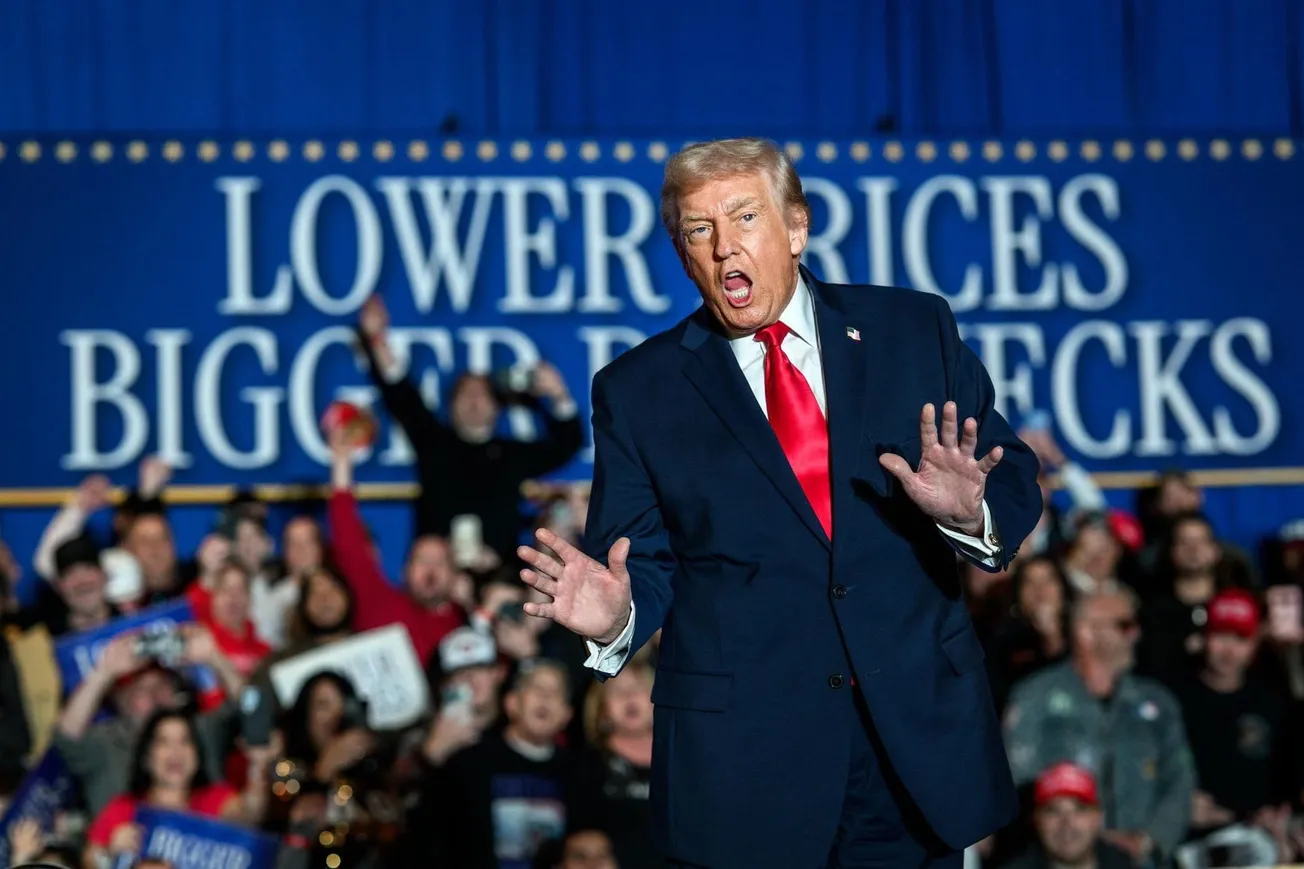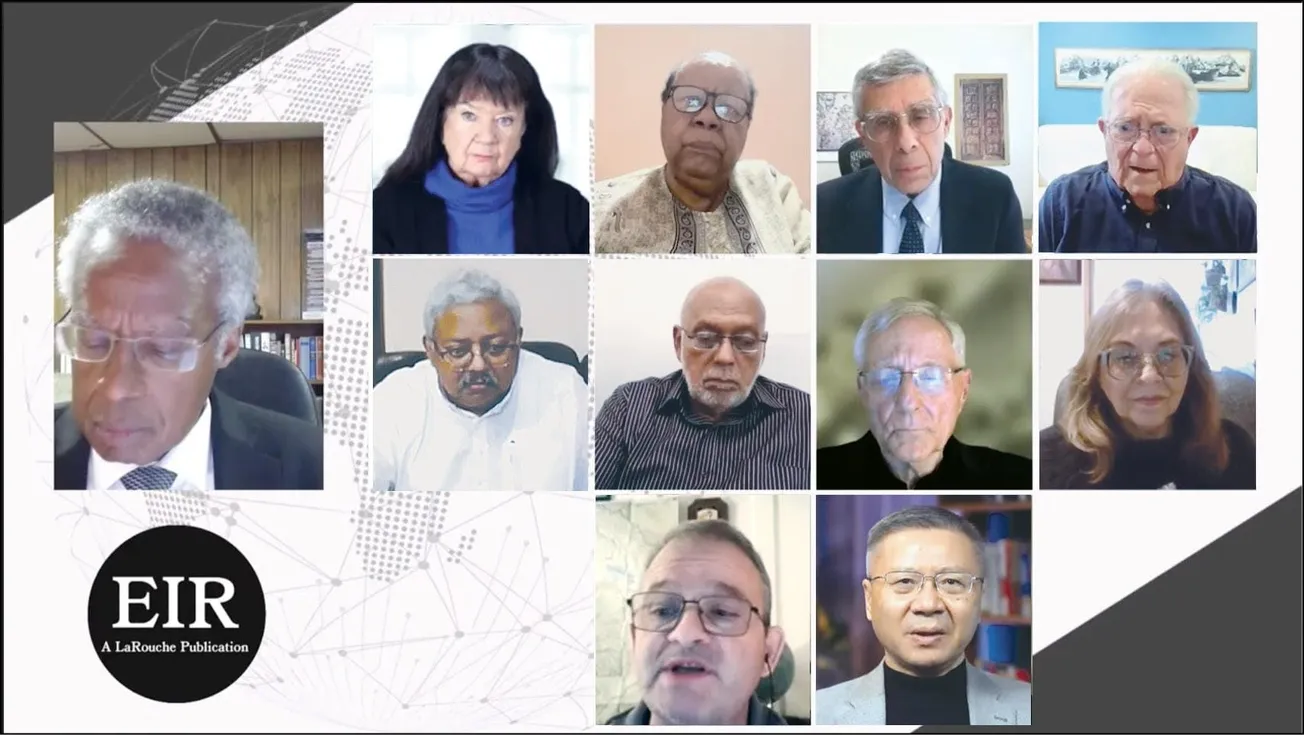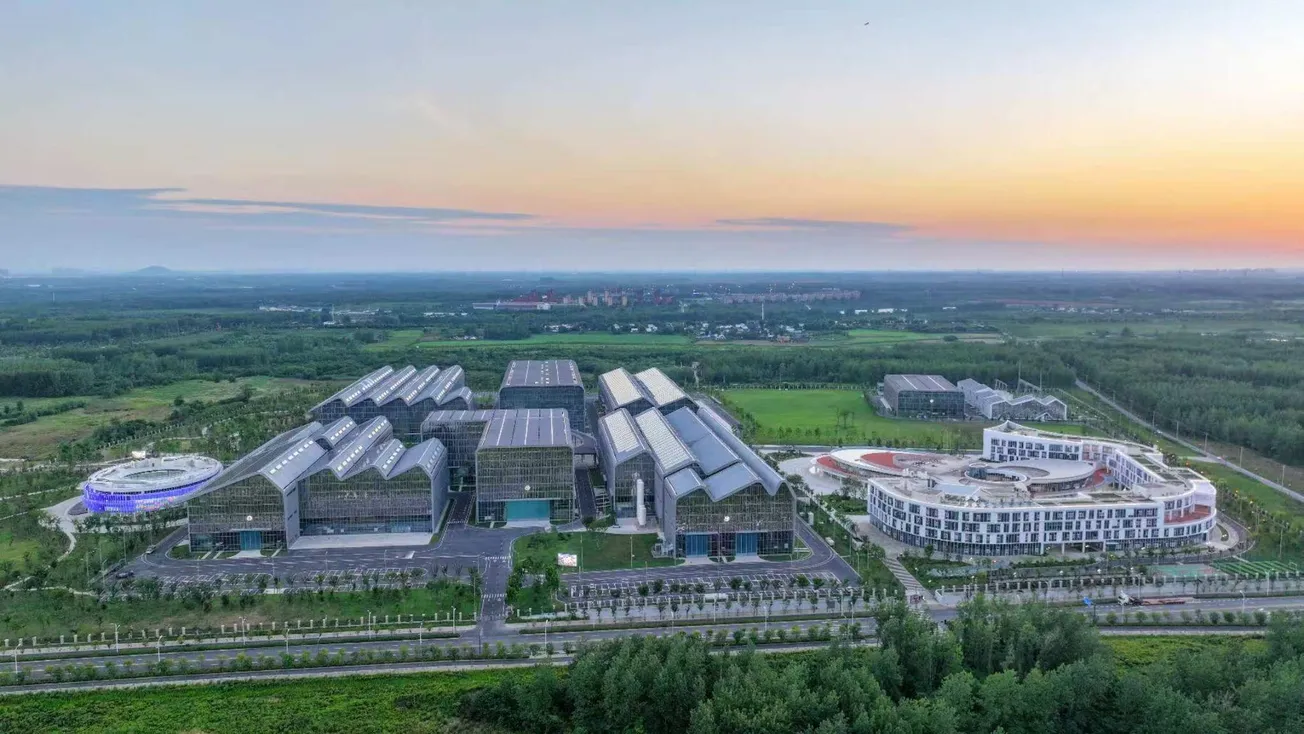Nov. 9—Russian President Vladimir Putin addressed the plenary session of the 21st annual Valdai Discussion Club, held Nov. 7 in Sochi, concluding the four days of this conference dedicated to the central issue facing the world’s nations: “Lasting Peace on What Basis? Common Security and Equal Opportunities for Development in the 21st Century.”
We provide below lengthy excerpts of his groundbreaking opening address, selecting those parts of his argument focused on the principles upon which he proposes humanity can together create a new international system, one which can unite all nations and cultures in harmony in a living, beautiful polyphony. We expect these excerpts will inspire our readers to read through the full speech, with its references to the broader historical context of this fight and Russia’s actions. The speech is available in English on the Kremlin website here. Subheads have been added.
We are also destined to live in an era of fundamental, even revolutionary changes, and not only to comprehend but also to take a direct part in the most complex processes of the first quarter of the 21st Century…. We are witnessing the formation of a completely new world order, nothing like we had in the past, such as the Westphalian or Yalta systems.
New powers are rising. Nations are becoming more and more aware of their interests, their value, uniqueness and identity, and are increasingly insistent on pursuing the goals of development and justice. At the same time, societies are confronted with a multitude of new challenges, from exciting technological changes to catastrophic natural disasters, from outrageous social division to massive migration waves and acute economic crises….
There comes, in a way, the moment of truth. The former world arrangement is irreversibly passing away, actually it has already passed away, and a serious, irreconcilable struggle is unfolding for the development of a new world order. It is irreconcilable, above all, because this is not even a fight for power or geopolitical influence. It is a clash of the very principles that will underlie the relations of countries and peoples at the next historical stage. Its outcome will determine whether we will be able, through joint efforts, to build a world that will allow all nations to develop and resolve emerging contradictions based on mutual respect for cultures and civilizations, without coercion and use of force. And finally, whether the human society will be able to retain its ethical humanistic principles, and whether an individual will be able to remain human.
At first glance, it might appear that there is no alternative. Yet, regrettably, there is. It is the dive of humanity into the depths of aggressive anarchy, internal and external splits, the erosion of traditional values, the emergence of new forms of tyranny, and the actual renunciation of the classical principles of democracy, along with fundamental rights and freedoms….
The peril lies in the imposition of totalitarian ideologies and making them the norm, as exemplified by the current state of Western liberalism. This modern Western liberalism, in my view, has degenerated into extreme intolerance and aggression towards any alternative or sovereign and independent thought. Today, it even seeks to justify neo-Nazism, terrorism, racism, and even the mass genocide of civilians.
Moreover, there are international conflicts and confrontations fraught with the danger of mutual destruction….
Russia’s Red Lines Have Been Reached
I have previously stated that we have reached red lines. The West’s calls to inflict a strategic defeat on Russia, a nation with the largest arsenal of nuclear weapons, reveal the reckless adventurism of certain Western politicians. Such blind faith in their own impunity and exceptionalism could lead to a global catastrophe. Meanwhile, the former hegemons, who have been accustomed to ruling the world since colonial times, are increasingly astonished that their commands are no longer heeded. Efforts to cling to their diminishing power through force result only in widespread instability and more tensions, leading to casualties and destruction….
It is my deep conviction that the only new international system possible is one embracing polyphony, where many tones and many musical themes are sounded together to form harmony. If you like, we are moving towards a world system that is going to be polyphonic rather than polycentric, one in which all voices are heard and, most importantly, absolutely must be heard. Those who are used to soloing and want to keep it that way will have to get used to the new “scores.”
Instead of recognizing the futility of their ambitions and the objective nature of change, certain Western elites seem poised to go to any lengths to thwart the development of a new international system that aligns with the interests of the Global Majority. In the recent policies of the United States and its allies, for instance, the principle of “You shall not belong to anyone!” or “You’re either with us or against us” has become increasingly evident. I mean to say, such a formula is very dangerous. After all, as the saying of our and many other countries goes, “What goes around comes around.”
Chaos, a systemic crisis is already escalating in the very nations that attempt to implement such strategies. The pursuit of exclusivity, liberal and globalist messianism and ideological, military, and political monopoly is steadily depleting those countries that pursue these paths, pushing the world towards decline, and starkly contradicting the genuine interests of the people in the United States and European countries.
I am confident that sooner or later the West will come to this realization. Historically, its great achievements have always been rooted in a pragmatic, clear-eyed approach based on a tough, sometimes cynical but rational evaluation of circumstances and their own capabilities.
In this context, I wish to emphasize once more: unlike our counterparts, Russia does not view Western civilization as an adversary, nor does it pose the question of “us or them.” I reiterate: “You’re either with us or against us” is not part of our vocabulary. We have no desire to teach anyone or impose our worldview upon anyone. Our stance is open and it is as follows.
The End of Hegemony
The West has indeed amassed significant human, intellectual, cultural, and material resources which enable it to thrive as one of the key elements of the global system. However, it is precisely “one of” alongside other rapidly advancing nations and groups. Hegemony in the new international order is not a consideration. When, for instance, Washington and other Western capitals understand and acknowledge this incontrovertible fact, the process of building a world system that addresses future challenges will finally enter the phase of genuine creation. God willing, this should happen as soon as possible. This is in the shared interest, especially for the West itself.
So far, we—meaning all those interested in creating a just and stable world—have been using too much energy to resist the destructive activities of our opponents, who are clinging to their monopoly. This is obvious, and everyone in the West, the East, the South and everywhere else is aware of this. They are trying to preserve their power and monopoly, which is obvious.
These efforts could be directed with much better results towards addressing the common problems that concern everyone, from demography and social inequality to climate change, food security, medicine and new technology. This is where we should focus our energy, and this is what all of us should be doing.
I will take the liberty of making a number of philosophical digressions today….
Recently, the collective West—the so-called collective West—made an unprecedented attempt to banish Russia from global affairs and from the international economic and political systems. The number of sanctions and punitive measures applied against our country has no analogues in history. Our opponents assumed that they would inflict a crushing defeat, dealing a knockout blow to Russia from which it would never recover, thereby ceasing to be one of the permanent fixtures in the international community….
Some Western elites thought that their monopoly and the moment of unipolarity in the ideological, economic, political and partially even military-strategic sense were the destination point. Here we are. Stop and enjoy the moment! This is the end of history, as they arrogantly announced.
I do not need to tell this audience how short-sighted and inaccurate that assumption was. History has not ended. On the contrary, it has entered a new phase. And the reason is not that some malicious opponents, rivals or subversive elements prevented the West from establishing its system of global power…. [T]hat system started wobbling on its own, under the weight of the ambitions and greed of those Western elites….
What conflict are we witnessing today? I am confident that it is not a conflict of everyone against everyone caused by a digression from the rules the West keeps telling us about. Not at all. It is a conflict between the overwhelming majority of the global population, which wants to live and develop in an interconnected world with a great deal of opportunities, and the global minority, whose only concern, as I have said, is the preservation of its domination….
[T]he coexistence of conflict and the pursuit of harmony is inherently unstable. The contradictions of our era must eventually be resolved through synthesis, transitioning to a new quality. As we embark on this new phase of development, building a new global architecture, it is crucial for us all to avoid repeating the mistakes of the late 20th Century when, as I have previously stated, the West attempted to impose its, in my view, deeply flawed model of Cold War withdrawal, which was fraught with the potential for new conflicts.
In the emerging multipolar world, there should be no nations or peoples left as losers or feeling aggrieved and humiliated. Only then can we secure truly sustainable conditions for universal, equitable, and secure development….
Principles for Diplomacy in the New Paradigm
During my address at last year’s Valdai Forum, I ventured to delineate six principles which, in our estimation, ought to underpin relations as we embark upon a new phase of historical progression…. Let me expound upon these principles.
Firstly, openness to interaction stands as the paramount value cherished by the overwhelming majority of nations and peoples. The endeavor to construct artificial barriers is not only flawed because it impedes normal and advantageous to everyone economic progression, but also because it is particularly perilous amidst natural disasters and socio-political turmoil, which, unfortunately, are all too common in international affairs….
Secondly, we have consistently underscored the diversity of the world as a prerequisite for its sustainability. It may appear paradoxical, as greater diversity complicates the construction of a unified narrative. Naturally, universal norms are presumed to aid in this regard. Can they fulfil this role? It stands to reason that this is a formidable and complicated task….
The international community is a living entity, with its civilizational diversity making it unique and presenting an inherent value. International law is a product of agreements not even between countries, but between nations, because legal consciousness is an integral part of every unique culture and every civilization. The crisis of international law, which is the subject of broad public discussion today, is, in a sense, a crisis of growth.
The Harmony of a New, Polyphonic World
The rise of nations and cultures that have previously remained on the periphery of global politics for one reason or another means that their own distinct ideas of law and justice are playing an increasingly important role. They are diverse. This may give the impression of discord and perhaps cacophony, but this is only the initial phase. It is my deep conviction that the only new international system possible is one embracing polyphony, where many tones and many musical themes are sounded together to form harmony. If you like, we are moving towards a world system that is going to be polyphonic rather than polycentric, one in which all voices are heard and, most importantly, absolutely must be heard. Those who are used to soloing and want to keep it that way will have to get used to the new “scores” now….
Thirdly, we have said more than once that the new world can develop successfully only through the broadest inclusion…. In its very diversity, the emerging world is bound to be anything but simple. The more fully-fledged participants involved in this process, the more challenging it becomes to identify an optimal solution that satisfies all parties. Yet, once such a solution is achieved, there is hope that it will be both sustainable and enduring….
Next, the key principle of security for all without exception is that the security of one nation cannot be ensured at the expense of others’ security….
Actually, we see that the global minority is preserving and strengthening its military bloc [NATO] in order to maintain its power…. The emerging community within the BRICS framework serves as a prototype for new, free, and non-block relationships between states and peoples. This also highlights that even some NATO members, as you know, are interested in closer cooperation with BRICS. It is likely that other countries may also consider deeper collaboration with BRICS in the future.
This year, our country held the chairmanship of the group, culminating in a recent summit in Kazan. I cannot deny that building a unified approach among many countries, each with distinct interests, is a challenging task. Diplomats and government officials had to invest considerable effort, employ tact, and actively practice listening to one another to reach the desired outcome. This required significant dedication, but it fostered a unique spirit of cooperation grounded not in coercion, but in mutual understanding.
We are confident that BRICS serves as a strong example of genuinely constructive cooperation in today’s evolving international landscape. Additionally, BRICS platforms—where entrepreneurs, scientists, and intellectuals from our countries meet—can become spaces for deep philosophical and foundational insights into the current global development processes. This approach embraces the unique characteristics of each civilization, including its culture, history, and traditional identities.
Security Will Not Be Achieved Without Development
The future Eurasian security system, now beginning to take shape across our vast continent, is founded on a spirit of respect and mutual consideration of interests. This approach is not only genuinely multilateral but also multifaceted. Today, security is a complex notion which encompasses more than just military and political dimensions; it cannot be achieved without socio-economic development and the resilience of states against a range of challenges, from natural to man-made….
My fifth point is about justice for all. Inequality is the true scourge of the modern world. Countries face social tension and political instability within their borders due to inequality, while on the international stage the development gap that separates the so-called Golden Billion from the rest of humankind may not only result in more political differences and confrontation, but also, and even more importantly, exacerbates migration-related issues…. There is hardly a developed country on this planet that has not faced an increasingly uncontrolled and unmanageable inflow of people seeking to improve their well-being and social status and to have a future. Some of them are simply trying to survive….
We are confident that such issues as food security, energy security, access to healthcare and education, and finally, the orderly and free movement of people must not be impacted by whatever conflicts or disputes. These are fundamental human rights.
My sixth point is that we keep emphasizing that sovereign equality is an imperative for any lasting international framework…. [S]ometimes countries that may not be as powerful or large as others play an even greater role compared to great powers by being more rational and results-driven in using their human, intellectual capital, natural resources and environment-related capabilities, by being more flexible and smart when tackling challenging matters, by setting higher living and ethical standards, as well as in administration and management, while also empowering all their people to fulfil their potential and creating a favorable psychological environment. This approach can bring about scientific breakthroughs, promote entrepreneurial activity, art and creativity, and empower young people. Taken together, all of this counts in terms of global influence and appeal….
Over several centuries, the Western-centric world has embraced certain clichés and stereotypes concerning the global hierarchy. There is supposedly a developed world, progressive society and some universal civilization that everyone should strive to join—while at the other end, there are backward, uncivilized nations, barbarians. Their job is to listen unquestioningly to what they are told from the outside, and to act on the instructions issued by those who are allegedly superior to them in this civilizational hierarchy.
It is clear that this concept works for a crude colonial approach, for the exploitation of the Global Majority. The problem is that this essentially racist ideology has taken root in the minds of many, creating a serious mental obstacle to general harmonious growth…. The truth is that we see how they engage with other cultures that are different. On the surface, they show genuine interest in local music and folklore, seeming to praise and enjoy them, but beneath this facade, their economic and security policies remain neo-colonial….
Empathy for the Human Race
It should be remembered that everyone is equal, meaning that everyone is entitled to have their own vision, which is no better or worse than others—it is just different, and everyone needs to sincerely respect that. Acknowledging this can pave the way for mutual understanding of interests, mutual respect and empathy, that is, the ability to show compassion, to relate to others’ problems, and the ability to consider differing opinions or arguments. This requires not only listening, but also altering behavior and policies accordingly.
Listening and considering does not mean accepting or agreeing, not at all. This simply means recognizing the other party’s right to their own worldview. In fact, this is the first necessary step towards harmonizing different mindsets. Difference and diversity must be viewed as wealth and opportunities, not as reasons for conflict….








